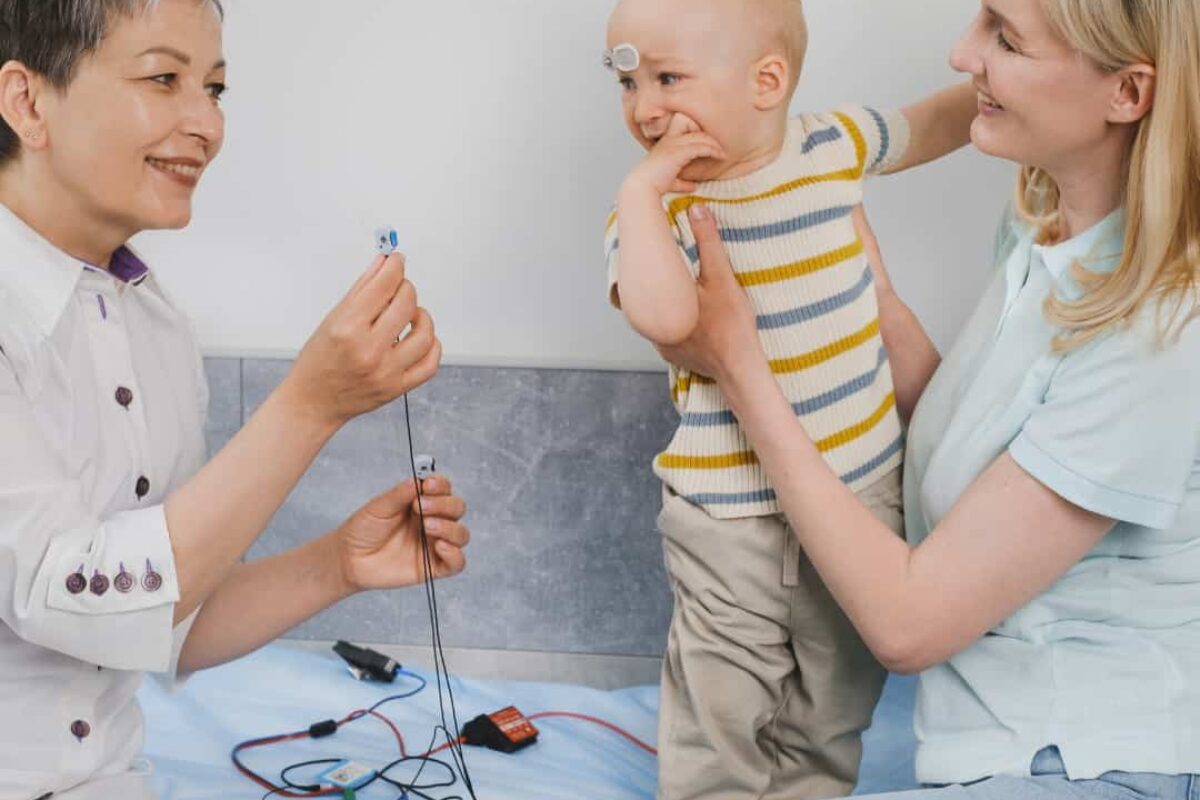An audiologist is a healthcare professional who specializes in identifying, diagnosing, treating, and monitoring disorders of the auditory and vestibular systems. They provide services aimed at preventing, identifying, and diagnosing hearing and balance disorders. They also manage and treat conditions like hearing loss, tinnitus, and balance problems.
The history of audiology dates back to the early 20th century and the First World War. It all started when soldiers returning home with damaged hearing led to the development of ‘aural rehab’ programs. In the years after World War II, with advancements in electronic technology and a better understanding of auditory processes, the field expanded and became more refined.
Today, audiology is constantly evolving, incorporating new technologies and approaches to improve the lives of those with hearing and balance disorders.
Education and Training
This section explores the two important aspects of education and training that are essential for professional development. Let’s dive into each component:
Academic Background
This aspect focuses on the foundational academic qualifications required for a particular field. In the context of education and training, it typically outlines the standard educational background needed to enter a profession.
For example, in healthcare or academia, it may involve degrees like bachelor’s, master’s, or doctorate levels, establishing the academic foundation for individuals pursuing careers in these sectors.
Specialized Training Programs
In addition to academic backgrounds, specialized training programs play a crucial role. These programs go beyond traditional education by providing hands-on, practical experience and specific skills relevant to a profession.
In fields like technology, healthcare, or vocational trades, these programs offer targeted, industry-specific training, ensuring individuals are equipped with practical competencies to excel in their chosen careers.
Core Responsibilities
This section is about the fundamental duties that are essential to a particular role or profession. So, let’s dive into each core responsibility.
Diagnostic evaluations are where things get interesting! They’re all about systematically assessing and analyzing relevant factors within a specific context. Take healthcare, for example.
Here, diagnostic evaluations involve examining patient symptoms, conducting tests, and formulating diagnoses. It’s a crucial responsibility that ensures accurate problem identification, setting the stage for effective decision-making and intervention strategies.
Now, let’s talk about another important core responsibility. Treatment modalities! These are all about applying therapeutic approaches or interventions.
It could mean developing and implementing treatment plans, administering medical procedures, or even using psychological interventions. Whether it’s in healthcare, education, or any other professional field, skillfully managing treatment modalities is key to addressing identified issues and achieving positive outcomes.
Tools and Technologies
This section takes a closer look at the essential instruments and technologies that play a pivotal role in a specific field or industry. So, let’s dive into each component:
Audiometric Tests
Audiometric tests are fundamental tools in the field of audiology. They help assess an individual’s hearing sensitivity and acuity.
Audiologists use calibrated equipment to measure a person’s ability to detect and differentiate sounds. These tests are crucial for diagnosing and managing hearing disorders. By providing precise information about a person’s auditory capabilities, audiometric tests help tailor interventions and treatment plans.
Hearing Aids
Now, let’s talk about hearing aids. They are advanced technological devices designed to amplify and enhance sound for individuals with hearing impairments.
Hearing aids come in different styles and functionalities, and they use innovative features to cater to different types and degrees of hearing loss. By providing enhanced auditory experiences in various environments, hearing aids significantly improve the quality of life for those facing hearing challenges.
Cochlear Implants
Lastly, let’s discuss cochlear implants. These sophisticated electronic devices are surgically implanted to directly stimulate the auditory nerve.
Cochlear implants are a transformative solution for individuals with severe to profound hearing loss. They enable users to perceive sound and speech, making a profound impact on communication and overall auditory experiences.
Pediatric Audiology
Pediatric audiology focuses on identifying hearing issues in children at an early stage. This allows for timely intervention, which is crucial for minimizing the impact of hearing impairments on a child’s speech and language development.
Audiologists in this field use specialized assessments and screenings to identify and address potential hearing challenges in children as soon as possible.
When it comes to treating children, pediatric audiology takes a child-centric approach by tailoring interventions to meet their unique needs and developmental stages.
This involves considering the child’s age, communication skills, and individual preferences. Treatment plans may include the use of hearing aids, cochlear implants, speech therapy, and other child-friendly strategies aimed at optimizing auditory development and improving their overall quality of life.
Geriatric Audiology
Geriatric audiology primarily focuses on age-related hearing loss, which is a pretty common condition that affects older individuals. As people get older, their hearing can gradually deteriorate, which can make it harder for them to understand and hear sounds properly.
Audiologists who specialize in geriatrics work on diagnosing and managing age-related hearing loss, taking into account its unique characteristics and how it can impact a person’s overall well-being.
When it comes to rehabilitating age-related hearing loss in geriatric audiology, there are various strategies that can be used. This might involve prescribing and fitting hearing aids, using assistive listening devices, and implementing communication strategies.
Audiologists work closely with older adults to create personalized rehabilitation plans that consider their preferences and lifestyle. The ultimate goal is to improve communication abilities and enhance the overall quality of life for older individuals facing hearing challenges.
Occupational Audiology
Occupational audiologists are the ones who conduct comprehensive assessments of workplace noise levels. They evaluate the intensity, duration, and types of noises that employees are exposed to. By doing this, they can identify potential risks and take measures to mitigate the impact of excessive noise on workers’ hearing health.
To protect workers from noise-induced hearing loss, occupational audiologists design and implement hearing conservation programs. These programs include preventive measures like using hearing protection devices, educating employees about the risks of noise exposure, conducting regular hearing screenings, and monitoring compliance with safety standards.
In a nutshell, occupational audiologists play a crucial role in ensuring a healthy and safe work environment when it comes to noise.
Specializations within Audiology
This section takes a closer look at different areas of expertise within audiology. So, let’s dive into each specialization:
Balance Disorders
Audiologists who specialize in balance disorders focus on assessing and managing issues related to the vestibular system. This system plays a role in balance and spatial orientation. They use specialized assessments and interventions to address conditions like vertigo or imbalance, ultimately improving overall stability and quality of life.
Tinnitus Management
Audiology specialists in tinnitus management are all about addressing the perception of ringing or buzzing sounds in the ears.
They use various diagnostic approaches to identify the underlying causes of tinnitus and develop personalized strategies for management. This may involve counseling, sound therapy, or other interventions to alleviate the impact of tinnitus on someone’s auditory experience.
Auditory Processing Disorders
Audiologists specializing in auditory processing disorders focus on assessing and managing difficulties in how the brain interprets auditory information.
This specialization involves evaluating how the central auditory system processes sounds and developing targeted interventions to enhance auditory processing skills, especially in challenging listening environments.
Audiologists in Research
This section dives into the fascinating role of audiologists in advancing knowledge and contributing to the broader field of auditory science. Let’s take a closer look at each aspect.
Audiologists who are involved in research play a crucial role in the continuous evolution of auditory science. They delve into various aspects of hearing, balance, and related areas, exploring new insights and discoveries.
Through their rigorous research methodologies, audiologists contribute to the development of innovative diagnostic tools, treatment methods, and a deeper understanding of loss and balance disorders and hearing and balance sciences. Their work pushes the boundaries of knowledge within their field, allowing them to treat hearing, prescribe hearing aids, and much more.
Audiologists are health care professionals, otherwise known as hearing instrument specialists, and they not only detect a balance system dysfunction but also help in other ways. Ear doctors could, for example, protect hearing by recommending protective hearing devices.
At the same time, audiologists actively share their research findings through publications, conferences, and collaborative initiatives, making significant contributions to the global knowledge base.
By disseminating their work, they play a pivotal role in enhancing the collective understanding of auditory health and fostering collaboration within the global scientific community. This sharing of knowledge leads to advancements in clinical practices, educational approaches, and policy development on a global scale.
Summary
In conclusion, the field of audiology plays a vital and often underappreciated role within the broader healthcare system. To recap, audiologists are responsible for diagnosing, managing, and treating disorders related to our auditory and balance systems.
They employ their extensive education and clinical training to provide personalized care to patients of all ages, helping to enhance their quality of life and communication abilities.
The importance of audiologists in healthcare cannot be overstated. They are the lifeline for individuals experiencing hearing or balance issues, offering a beacon of hope and a pathway to improved daily functioning.
In a world where effective communication is paramount, their role in restoring and maintaining our hearing health is truly invaluable.




![How Much Do NPs Make an Hour? [Full Guide]](https://www.fronterasearch.com/wp-content/uploads/2024/04/pexels-andrea-piacquadio-3952006-600x400.jpg)
